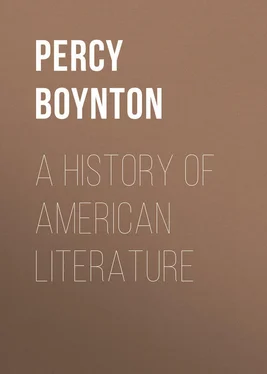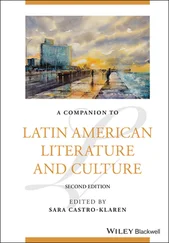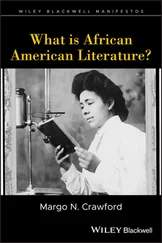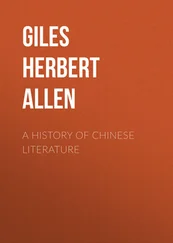Percy Boynton - A History of American Literature
Здесь есть возможность читать онлайн «Percy Boynton - A History of American Literature» — ознакомительный отрывок электронной книги совершенно бесплатно, а после прочтения отрывка купить полную версию. В некоторых случаях можно слушать аудио, скачать через торрент в формате fb2 и присутствует краткое содержание. Жанр: foreign_antique, foreign_prose, на английском языке. Описание произведения, (предисловие) а так же отзывы посетителей доступны на портале библиотеки ЛибКат.
- Название:A History of American Literature
- Автор:
- Жанр:
- Год:неизвестен
- ISBN:нет данных
- Рейтинг книги:4 / 5. Голосов: 1
-
Избранное:Добавить в избранное
- Отзывы:
-
Ваша оценка:
- 80
- 1
- 2
- 3
- 4
- 5
A History of American Literature: краткое содержание, описание и аннотация
Предлагаем к чтению аннотацию, описание, краткое содержание или предисловие (зависит от того, что написал сам автор книги «A History of American Literature»). Если вы не нашли необходимую информацию о книге — напишите в комментариях, мы постараемся отыскать её.
A History of American Literature — читать онлайн ознакомительный отрывок
Ниже представлен текст книги, разбитый по страницам. Система сохранения места последней прочитанной страницы, позволяет с удобством читать онлайн бесплатно книгу «A History of American Literature», без необходимости каждый раз заново искать на чём Вы остановились. Поставьте закладку, и сможете в любой момент перейти на страницу, на которой закончили чтение.
Интервал:
Закладка:
Exceedingly well-versed; and had devoted
To their attainment, far more time than has,
By the best teachers, lately been allotted;
For she had taken lessons, twice a week,
For a full month in each; and she could speak
French and Italian, equally as well
As Chinese, Portuguese, or German; and,
What is still more surprising, she could spell
Most of our longest English words off-hand;
Was quite familiar in Low Dutch and Spanish,
And thought of studying modern Greek and Danish;
and whose father, a man of newly affected silence that spoke “unutterable things,” was established in a mortgaged house filled with servants and “whatever is necessary for a ‘genteel liver’” and buttressed with a coach and half a dozen unpaid-for horses. At the same time the countryside was developing a native but not altogether admirable Yankee type. At their best, Halleck 8 8 “Wyoming,” stanza iv.
wrote,
The people of today
Appear good, honest, quiet men enough
And hospitable too – for ready pay;
With manners like their roads, a little rough,
And hands whose grasp is warm and welcoming, though tough.
And at their worst Whittier 9 9 “Among the Hills” (Prelude, 71 ff.).
looked back a half century, to 1818, and recalled them as
Shrill, querulous women, sour and sullen men,
Untidy, loveless, old before their time,
With scarce a human interest save their own
Monotonous round of small economies,
Or the poor scandal of the neighborhood;
Church-goers, fearful of the unseen Powers,
But grumbling over pulpit tax and pew-rent,
Saving, as shrewd economists, their souls
And winter pork, with the least possible outlay
Of salt and sanctity; in daily life
Showing as little actual comprehension
Of Christian charity and love and duty
As if the Sermon on the Mount had been
Outdated like a last year’s almanac.
A natural consequence of such criticism from without, and such raw and defective culture within the country, was that American writers of any moment bided their time as patiently as they could, recognizing that for the moment America must be a nation of workers who were
rearing the pedestal, broad-based and grand,
Whereon the fair shapes of the Artist shall stand,
And creating, through labors undaunted and long,
The theme for all Sculpture and Painting and Song. 10 10 Lowell, “Fable for Critics.”
Finally, it is worth noting that the first three eminent writers in nineteenth-century America were themselves not university products. Bryant withdrew from Williams College at the end of the first year, and Cooper from Yale toward the end of the second. The real education of these two and of Irving, who did not even enter college, was in the world of action rather than in the world of books, and their associates were for the most part men of affairs.
WASHINGTON IRVING
Many of the facts about the boyhood and youth of Washington Irving (1783–1859) are typical of his place and his period as well as true of himself. The first is that he was born (in New York City) of British-American parents, his father a Scotch Presbyterian from the Orkney Islands and his mother an Englishwoman. His father’s rigid religious views dominated in the upbringing of himself and his six brothers and sisters. Two nearly inevitable results followed: one, that as a boy he grew to believe that almost everything that was enjoyable was wicked, and the other, that as he came toward manhood he was particularly fond of the pleasures of life. A boy of his capacities in Boston at this time would have been more than likely to go to Harvard College, which was a dominating influence in eastern Massachusetts, but King’s College (Columbia) occupied no such position in New York. Irving’s higher education began in a law office, and then, when his health seemed to be failing, was continued by travel abroad. The long journey, or series of journeys, that he took from 1804 to 1806 were of the greatest importance. They were important to Irving because he was peculiarly fitted to get the greatest good from such informal education. He was an attractive young fellow, so that it was easy for him to make and to hold friends; and he was blessed with his father’s moral balance, so that he did not fall into bad habits. He was so far inclined to laziness that it is doubtful if he would have achieved much if he had gone to college, but he was wide-awake and receptive, so that he absorbed information wherever he went. Furthermore, he had a mind as well as a memory, and he came back to America stocked not merely with a great lot of miscellaneous facts but with a real knowledge of human nature and of human life.
From the day of his return to New York in 1806 to the day of his death, in 1859, Washington Irving had an international point of view and developed steadily into an international character. His first piece of writing was that of a very young man, but a young man of promise. Like the other Americans of his day he had read a good deal of English literature written in the eighteenth century; and among the essayists of that century who had attracted his attention one was Oliver Goldsmith. New York supplied him with his subjects and Goldsmith with his method of attack, for he wrote, in company with one of his brothers and a mutual friend, a series of amusing criticisms on the ways of his townsmen, modeling his Salmagundi Papers after Goldsmith’s Citizen of the World . This was at once independent and imitative. The youthful authors blithely announced in their introductory number that they proposed to “instruct the young, reform the old, correct the town, and castigate the age.” In the twenty-two papers that came out at irregular intervals between January, 1807, and January, 1808, they criticized everything that struck their attention, and they had their eyes wide open. The American love of display, the inclination to indulge in fruitless discussion which made the country a “logocracy” rather than a democracy, the lack of both judgment and order which marked their political elections, and their social and literary fashions make just a beginning of the list of subjects held up to genial ridicule. Yet, though the criticism was fair and to the point, it was an old-fashioned kind of comment, the kind that England had been feeding on for the better part of a century, ever since Addison and Steele had made it popular in the Tatler and the Spectator . Moreover, it was done in an old-fashioned way, for in making Mustapha Rub-a-Dub Keli Khan, the Tripolitan, the foreign commentator on American life as he saw it with a stranger’s eyes, they were using a device that was old even before it was employed by the Englishman from whom they borrowed it. The Salmagundis are interesting, however, as early representatives of a longish succession of satires on the life of New York, all pleasant and rather pleasantly superficial. Three years later Irving, this time alone, followed up this initial success with his “Knickerbocker’s History of New York,” not as serious a piece of work as its title at first suggests, for it was a burlesque of a heavy and pretentious history on the same subject which had appeared just before. Like the Salmagundis it was vivacious and impertinent, the very clever work of a very young man.
Now for ten years Washington Irving produced nothing as a writer. He was engaged in business with his brothers, and proved himself the most level-headed member of a pretty unbusinesslike combination. In 1815, in connection with one of their many ambitious and unsuccessful schemes, he went abroad, probably without the least suspicion that he would be absent from his own country for seventeen years and that he would return to it as a celebrated writer widely read in two continents. The first step toward his wider reputation came in 1819 with the publication in London of “The Sketch Book,” the best known of all his works. This was followed in 1822 by “Bracebridge Hall” and in 1824 by “Tales of a Traveller,” both similar in tone and contents to “The Sketch Book.” With a reputation as a graceful writer of sketches and stories now thoroughly established, he turned to a more substantial and ambitious form of work in the composition of “The History of the Life and Voyages of Christopher Columbus,” living and writing in Madrid for the two years before its publication in 1828; and this book he followed quickly, as in the case of “The Sketch Book,” with two other productions of the same kind – “The Conquest of Granada” in 1829 and “The Voyages and Discoveries of the Companions of Columbus” in 1831. For three years before his return to America, Irving served as Secretary of Legation to the court of St. James, London, and then came back to enjoy at home a popularity which had been almost wholly earned abroad. Out of his career thus far four main facts deserve attention. First, that his literary work began with two pieces of social satire, written in a boyish, jovial manner which he largely abandoned in later years; second, that his fame was established on works of “The Sketch Book” type, made up of short units, gracefully written, and full of quiet humor and tender sentiment (now and again he continued in this sort of composition up to the end of his life); third, that in his maturer years he resorted to the writing of formal history, and that he followed the first three studies, done in Spain, with “Oliver Goldsmith” in 1849, “Mahomet and his Successors” in 1850, and “The Life of Washington,” completed in 1859, the year of his death. To these literary facts should be added a fourth which is both literary and political and of no small significance in history – the fact of Irving’s appointment to a post in the foreign diplomatic service. This was to be followed in his own life by his four years as Minister to Spain in 1842–1846, under President Harrison, and in the next fifty years by a distinguished list of other appointments to the consular and diplomatic staffs. No single group has done more to bring honor to the United States in the courts of Europe during the nineteenth century than writers like Irving, Hawthorne, Motley, Howells, Bayard Taylor, Lowell, Hay, and their successors down to Thomas Nelson Page and Brand Whitlock.
Читать дальшеИнтервал:
Закладка:
Похожие книги на «A History of American Literature»
Представляем Вашему вниманию похожие книги на «A History of American Literature» списком для выбора. Мы отобрали схожую по названию и смыслу литературу в надежде предоставить читателям больше вариантов отыскать новые, интересные, ещё непрочитанные произведения.
Обсуждение, отзывы о книге «A History of American Literature» и просто собственные мнения читателей. Оставьте ваши комментарии, напишите, что Вы думаете о произведении, его смысле или главных героях. Укажите что конкретно понравилось, а что нет, и почему Вы так считаете.











